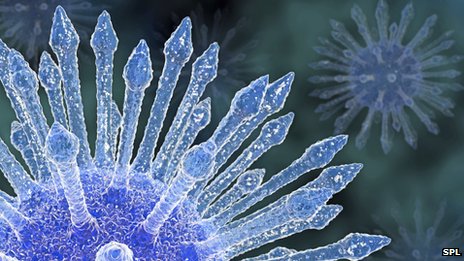By James Gallagher
Health and science reporter, BBC News
A potential new HIV treatment has a „profound and unprecedented“ impact on the virus, according to animal studies published in the journal Nature.
Potent antibodies were able to wipe a hybrid of human and monkey immunodeficiency viruses from the bloodstream of monkeys within days.
The findings could „revolutionise“ the search for an HIV cure, say experts.
The US researchers said trials in patients with HIV now needed to take place.
The immune system produces precisely targeted antibodies to take out HIV, but the virus is able to rapidly mutate to evade the immune assault.
However, some antibodies have been discovered that target the „conserved“ parts of HIV – those that the virus struggles to change because they are vital for it to function.
‚Undetectable‘
Two groups, from Harvard Medical School and the National Institute of Allergy and Infectious Diseases, performed the first trials of these antibodies.
They used rhesus macaques that had been infected with simian-human immunodeficiency virus (SHIV), a blend of HIV and the monkey equivalent.
Data from the Harvard team showed that injection of the antibodies drove SHIV from the bloodstream until it reached undetectable levels after three to seven days.
The effect lasted for one to three months, but in three monkeys the virus did not return to the blood during the 250-day study.
Prof Dan Barouch told the BBC: „The effect with these potent antibodies is profound and unprecedented. It’s probably as large an antiviral therapeutic effect as has ever been seen.
„But we have to make sure we don’t overhype and the limitation is the study is in animals, not humans.“
The antibodies were also able to attack the virus in some tissues. Drugs can assault the virus in the blood during normal HIV treatment, but the virus can hide in other parts of the body.
These early findings raise the prospect of using antibodies to clear these tissues as well.
Similar results were produced by the team at the National Institute of Allergy and Infectious Diseases
‚Revolutionise‘
HIV infection is incurable, although taking a daily dose of medication can keep the virus in check, giving patients a near-normal life expectancy.
The antibodies will be tested in human clinical trials and if successful they could be used alongside antiretroviral drugs as a treatment.
It may also be possible to devise a vaccine that could train the immune system to produce these antibodies.
However, both these ideas are dependent on human trials being successful.
Commenting on the findings, Prof Louis Picker and Prof Steven Deeks said: „The findings of these two papers could revolutionise efforts to cure HIV.“
However, they warned that HIV was so prone to mutation that it was „likely that some people will harbour viruses that are resistant to one or more“ of the antibodies.

